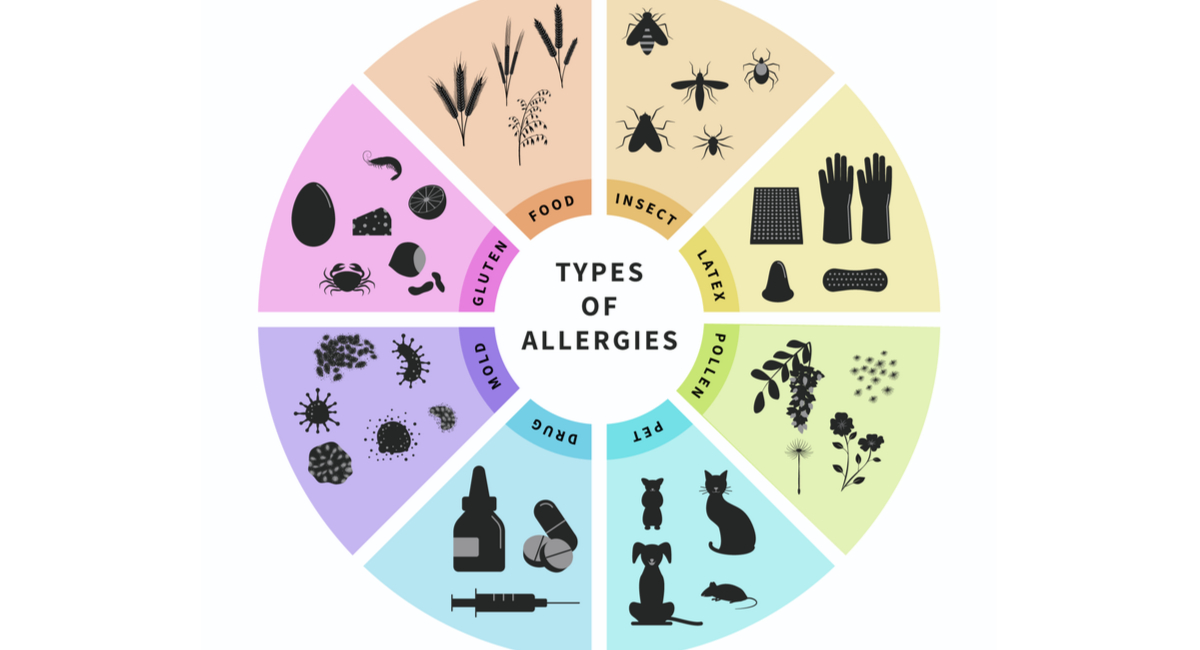
An allergy is an exaggerated immune response or reaction to substances that are generally not harmful.
Heredity, environmental conditions, number and type of exposures and emotional factors can indicate a predisposition to allergies.
Allergy symptoms vary, but may include:
- Breathing problems
- Burning, tearing, or itchy eyes
- Conjunctivitis (red, swollen eyes)
- Coughing
- Diarrhea
- Headache
- Hives
- Itching of the nose, mouth, throat, skin, or any other area
- Runny nose
- Skin rashes
- Stomach cramps
- Vomiting
- Wheezing
Food allergy occurs when the immune system mistakenly attacks a food protein. Ingestion of the offending food may trigger the sudden release of chemicals, including histamine, resulting in symptoms of an allergic reaction. The symptoms may be mild (rashes, hives, itching, swelling, etc.) or severe (trouble breathing, wheezing, loss of consciousness, etc.
Diagnosis
A skin prick test or a blood test (such as the Immulite or ImmunoCap test) for IgE antibodies is commonly used to begin to determine if an allergy exists. A skin prick test is usually less expensive and can be done in the doctor's office.
Positive skin prick tests or immunoassay test results will show that IgE is present in the body, but cannot alone predict that a reaction will occur if the patient were to eat a suspected allergy-causing food.
The results of the tests are combined with other information, such as a history of symptoms and the result of a food challenge to determine whether a food allergy exists.
Treatment
Strict avoidance of the allergy-causing food is the only way to avoid a reaction. Reading ingredient labels for all foods is the key to avoiding a reaction. If a product doesn't have a label, individuals with a food allergy should not eat that food. If you have any doubt whether a food is safe, call the manufacturer for more information. There is no cure for food allergies. Studies are inconclusive about whether food allergies can be prevented.
Epinephrine, also called adrenaline, is the medication of choice for controlling a severe reaction. It is available by prescription as a self-injectable device (EpiPen® or Auvi -Q®)
Symptoms
Symptoms may include one or more of the following: a tingling sensation in the mouth, swelling of the tongue and the throat, difficulty breathing, hives, vomiting, abdominal cramps, diarrhea, drop in blood pressure, loss of consciousness, and even death. Symptoms typically appear within minutes to two hours after the person has eaten the food to which he or she is allergic.
Prevention
Studies are inconclusive about whether food allergies can be prevented. Parents should become familiar with the early signs of allergic disease such as eczema, hives, repeated diarrhea and/or vomiting in reaction to formulas, wheezing, and talk to a doctor about those symptoms.
At this time, no medication can be taken to prevent food allergies. Strict avoidance of the allergy-causing food is the only way to prevent a reaction. Medications are administered to control symptoms after a reaction occurs.
For more information on allergies, use the link below:
http://www.foodallergy.org/